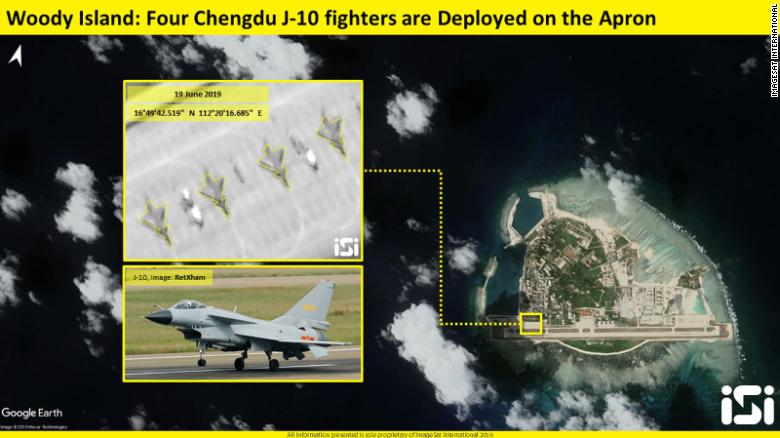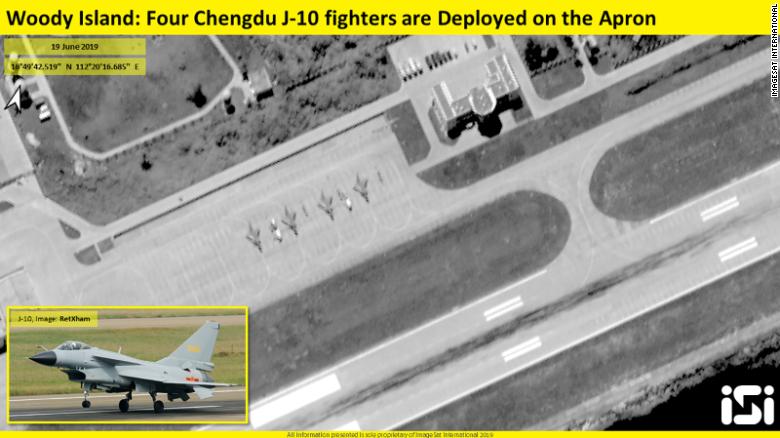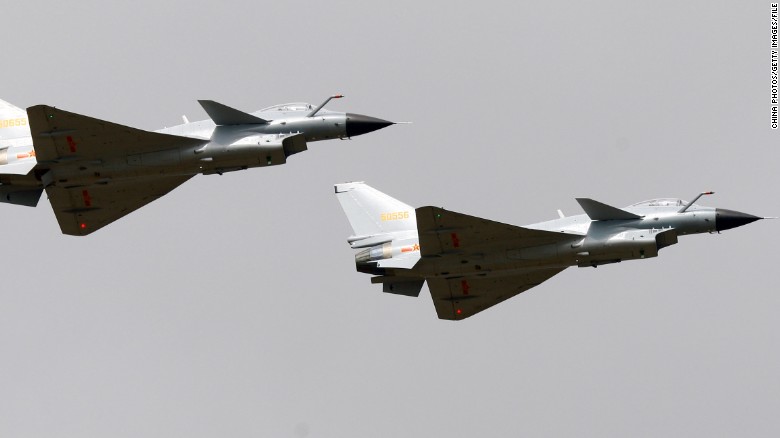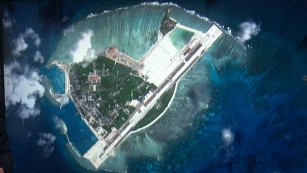South China Sea: Satellite image shows Chinese fighter jets deployed to contested island
By
, CNN
Updated 5:58 AM ET, Thu June 20, 2019
I guess they are sending message here
Intelligence Report by ImageSat International (ISI).
Hong Kong (CNN)A satellite image obtained by CNN shows China has deployed at least four J-10 fighter jets to the contested Woody Island in the South China Sea, the first known deployment of fighter jets there since 2017.
The image was taken Wednesday and represents the first time J-10s have been seen on Woody or any Chinese-controlled islands in the South China Sea, according to , which supplied the image to CNN.
The deployment comes as tensions remain high in the South China Sea and Chinese President Xi Jinping prepares to meet United States President Donald Trump at the G-20 summit in Japan next week.
Analysts who looked at the satellite photo for CNN said both the placement of the planes out in the open and accompanying equipment is significant and indicates the fighter jets were on the contested island for up to 10 days.
"They want you to notice them. Otherwise they would be parked in the hangars," said Peter Layton, a former Royal Australian Air Force officer and fellow at the Griffith Asia Institute. "What message do they want you to take from them?"
Carl Schuster, a former director of operations at the US Pacific Command's Joint Intelligence Center, said the deployment is designed to "demonstrate it is their territory and they can put military aircraft there whenever they want."
"It also makes a statement that they can extend their air power reach over the South China Sea as required or desired," Schuster said.
The J-10 jets have a combat range of about 500 miles (740 kilometers), putting much of the South China Sea and vital shipping lands within reach, Schuster said.
The four planes are not carrying external fuel tanks, the analysts said. That suggests they were to be refueled on the island, so the plan may be to keep them there awhile.
Chinese J-10 fighters fly at Airshow China in Zhuhai in 2010.
"It could be an early training deployment as part of getting the J-10 squadron operationally ready for an ADIZ (air defense identification zone) declaration," Layton said. "This activity may be the new normal."
China said in 2016 it reserved the right to
, which would require aircraft flying over the waters to first notify Beijing. It set up
, prompting an outcry from Japan and the United States, but the zone has not been fully enforced.
Woody Island, known as Yongxing in China, is the largest of the Paracel chain, also known as the Xisha Islands in China.
The Paracels sit in the north-central portion of the 1.3 million-square-mile South China Sea. They are also claimed by Vietnam and Taiwan, but have been occupied by China since 1974, when Chinese troops ousted a South Vietnamese garrison.
The past several years have seen Beijing substantially upgrade its facilities on the islands, deploying surface-to-air missiles, building 20 hangars at the airfield, upgrading two harbors and performing substantial land reclamation, according to the Asia Maritime Transparency Initiative.
Woody Island has served as a blueprint for Beijing's more prominent island-building efforts in the Spratly chain to the south, AMTI said in a 2017 report.
Why it's so tense in the South China Sea 01:17
The appearance of the J-10s on Woody Island comes just over a year after
for test flights for the first time.
The PLA claimed that mission was a part of China's aim to achieve a broader regional reach, quicker mobilization, and greater strike capabilities.
"The islands in the South China Sea are China's territory," Chinese Foreign Ministry spokesman Lu Kang said after the bomber flights. "The relevant military activities are normal trainings and other parties shouldn't over-interpret them."
A military expert, Wang Mingliang, was quoted in a Chinese statement as saying the training would hone the Chinese air force's war-preparation skills and its ability to respond to various security threats in the region.
In 2017, a
, said fighter jets -- J-11s -- were deployed to Woody Island for the first time, with the new hangars able to protect the warplanes from the island's high heat and humidity.
That report said such hangars would be useful on other Chinese islands to greatly enhance Beijing's control over the South China Sea.




